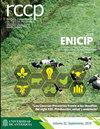贮藏期对晒干啤酒糟营养和微生物价值的影响
IF 0.5
4区 农林科学
Q4 AGRICULTURE, DAIRY & ANIMAL SCIENCE
引用次数: 2
摘要
背景:啤酒糟是啤酒工业的副产品,可列入反刍动物的饮食中。然而,它的高湿度使其难以储存和保存。目的:评价湿啤酒糟(WBG)的日光脱水效果及贮存期对其营养和微生物质量的影响。方法:采用完全随机的实验设计来评估WBG的脱水效率,处理时间分别为0、1、2、4、6、8、10、12、14和16小时。使用完全随机设计进行第二个实验,以评估以下处理的储存效果:干燥副产品储存0、10、20、30、60、90、120、150和180天。结果:干物质含量随脱水时间的延长呈线性增加。干燥啤酒糟的化学成分与储存期无关。不消化蛋白质本文章由计算机程序翻译,如有差异,请以英文原文为准。
Influence of storage period on the nutritional and microbiological value of sun-dried brewer’s grains
Background: Brewer's grains, a by-product of the brewery industry, can be included in the diet of ruminants. However, its high humidity makes it difficult to store and preserve. Objective: To evaluate the efficiency of sun dehydration of wet brewer’s grains (WBG) and the effect of storage period on its nutritional and microbiological quality. Methods: A completely randomized experimental design was used to evaluate WBG dehydration efficiency, with treatments corresponding to 0, 1, 2, 4, 6, 8, 10, 12, 14 and 16 hours of sun exposure. A second experiment was carried out using also a completely randomizeddesign to evaluated the effect of storage with the following treatments: 0, 10, 20, 30, 60, 90, 120, 150 and 180 days of storage of the dry byproduct. Results: Dry matter (DM) content linearly increased with dehydration period. The chemical composition of the dried brewer's grains had no effect as a function of storage period. Indigestible protein
求助全文
通过发布文献求助,成功后即可免费获取论文全文。
去求助
来源期刊

Revista Colombiana De Ciencias Pecuarias
AGRICULTURE, DAIRY & ANIMAL SCIENCE-
CiteScore
0.80
自引率
0.00%
发文量
18
审稿时长
6-12 weeks
期刊介绍:
The editors of Revista Colombiana de Ciencias Pecuarias (RCCP) welcome the submission of original manuscripts on experimental and clinical studies associated with the broad areas of animal sciences and veterinary medicine as they interface with biochemistry, molecular biology, physiology, pharmacology, toxicology, pathology, microbiology, parasitology, immunology and epidemiology. The scope of the journal includes studies of basic and applied research in animal management and production, feeding and nutrition, reproduction, breeding, genetics, animal welfare and behavior; as well as animal production focussed from biotechnology, soil science, agrostology, silvopastoral systems, livestock economics and the environment.
The criteria for acceptance of papers submitted for publication are originality, quality and clarity of the content. Each contribution must be based on original, unpublished research that has not been simultaneously submitted to other journals. All papers will be peer reviewed. All authors bear responsibility for ensuring the integrity and quality of their reported research. It is the author''s responsibility to secure permission to use figures or tables that have been published elsewhere.
Contributions may be classified as original research, review, rapid communication, clinical case studies or methodological articles, as well as news/commentaries or letters to the editor. Most review articles are invited by the editor. Authors interested in submitting a review article should contact the corresponding editor. Rapid publication of original manuscripts is a goal of the journal. Manuscripts must be written in English. Each manuscript is considered for publication with the understanding that it has not been simultaneously submitted to any other journal. Upon acceptance for publication, papers are subject to editorial review and revision.
 求助内容:
求助内容: 应助结果提醒方式:
应助结果提醒方式:


